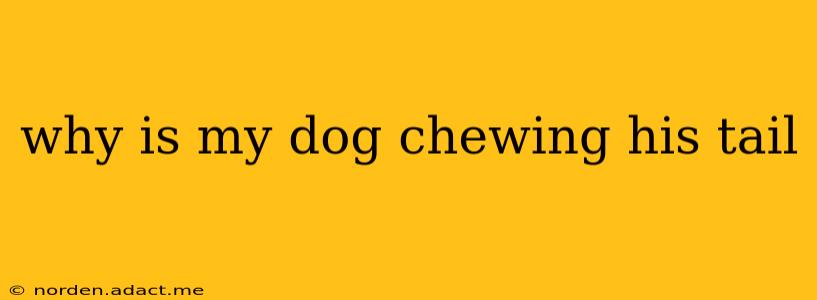Is your dog incessantly chewing his tail? This seemingly simple behavior can stem from a variety of underlying causes, ranging from simple irritations to serious medical conditions. Understanding the reasons behind this behavior is crucial for addressing it effectively and ensuring your dog's well-being. This comprehensive guide explores the common culprits and offers advice on how to help your furry friend.
Common Reasons for Tail Chasing and Chewing
Several factors can contribute to a dog chewing his tail. Let's delve into the most prevalent reasons:
Allergies and Skin Irritations
Allergies, whether environmental (pollen, dust mites) or food-related, can cause intense itching and discomfort. This irritation often leads dogs to lick, chew, and bite at the affected areas, including their tails. Fleas are another significant contributor, causing relentless itching that can drive a dog to self-mutilation. Skin conditions like hot spots (moist dermatitis) can also be extremely itchy and painful, leading to excessive chewing.
Parasites
Beyond fleas, other parasites like ticks, mites, and lice can infest a dog's tail, causing irritation and discomfort that prompts chewing. These parasites can be difficult to spot, so a veterinary examination is essential to rule them out.
Medical Conditions
Certain medical conditions can manifest as tail chewing. These include:
- Anal gland problems: Impacted or infected anal glands can cause discomfort in the rear area, leading a dog to lick and chew at its tail.
- Infections: Bacterial or fungal infections of the skin can cause intense itching.
- Pain: Pain in the tail itself, perhaps from an injury, can lead to chewing as a means of self-soothing or to alleviate discomfort.
Behavioral Issues
Sometimes, tail chewing is purely behavioral:
- Boredom and anxiety: A bored or anxious dog may resort to tail chewing as a way to relieve stress or occupy itself.
- Compulsive disorder: In some cases, tail chewing can be a manifestation of a compulsive disorder, similar to other repetitive behaviors.
- Attention-seeking: A dog may chew its tail to get your attention, even if it's negative attention.
Other Possible Causes
- Allergies: Food allergies, environmental allergies, or contact allergies can cause irritation.
- Hormonal imbalances: In rare cases, hormonal issues might contribute to excessive licking and chewing.
- Underlying medical conditions: Conditions like hypothyroidism or allergies can also be factors.
How to Stop Your Dog from Chewing His Tail
Addressing the root cause is paramount. Here's a step-by-step approach:
-
Veterinary Examination: The first and most crucial step is to take your dog to a veterinarian for a thorough examination. They can identify any underlying medical conditions, such as allergies, parasites, or skin infections. This is crucial before addressing behavioral issues.
-
Treat Underlying Conditions: Once the vet has diagnosed the problem, follow their treatment plan diligently. This might include medication for allergies, parasite treatment, or topical applications for skin infections.
-
Address Behavioral Issues: If the tail chewing is behavioral, your vet or a certified veterinary behaviorist can recommend strategies such as:
- Enrichment: Provide plenty of toys, puzzles, and exercise to keep your dog mentally and physically stimulated.
- Training: Teach your dog alternative behaviors, such as "leave it" or "settle."
- Anxiety management: If anxiety is a factor, techniques like pheromone diffusers or calming treats might help.
-
Preventative Measures: To prevent further tail chewing, consider:
- Keeping your dog's coat short: This reduces the potential for matting and irritation.
- Regular grooming: Brush your dog regularly to remove mats and debris.
- Supplements: Omega-3 fatty acids can improve skin and coat health, potentially reducing itching.
-
E-Collar (Elizabethan Collar): In severe cases, your vet might recommend an e-collar (cone) to prevent your dog from reaching its tail. This is a temporary measure while treating the underlying cause.
Important Note: Never punish your dog for tail chewing. Punishment won't address the underlying cause and may worsen the problem, increasing anxiety and potentially leading to more compulsive behaviors.
By carefully investigating the potential causes and working closely with your veterinarian, you can effectively address your dog's tail chewing and ensure their comfort and well-being. Remember, patience and consistent effort are key to resolving this issue.
